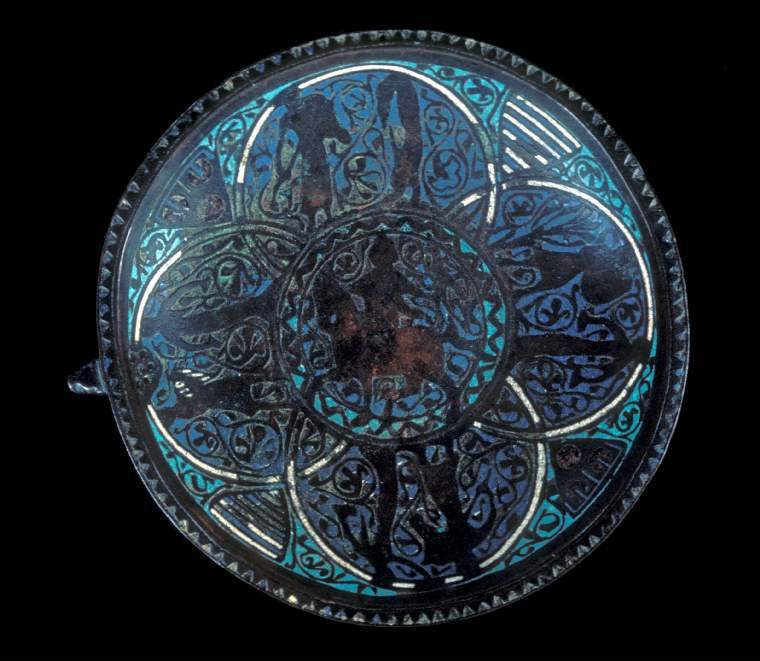Current Location: Gallery 32 (Rothschild)
Maker(s)
Workshop:
Unknown
Entities
Categories
Description
Copper and champlevé enamel
Copper, raised, engraved, champlevé and enamelled. The shallow circular bowl has a narrow rim, and a spout on the left side. In the centre there is a circular medallion enclosing a man on horseback with a hawk on his wrist and scrolling foliage reserved in a blue enamel ground, framed by a continuous zigzag line reserved in a turquoise band. On the sides there are four white overlapping semi-circular petal outlines each enclosing two figures, a man playing a musical instrument and a woman dancing, except for the outline at the top in which the woman is doing a handstand. In each of the spandrels is a coat-of-arms (two, repeated) flanked by scrolling foliage reserved in a turquoise ground. On the back is a rosette engraved on the base with eight petals at the centre, and nineteen godrons to the edge.
Notes
History note: Félix Doistau; sold Hotel Drouot, 22-25 November 1909, Catalogue des objets D'art et de haute curiosité, émaux champlevés, ivories . . . . le tout dépendant des Collections de M. Félix Doistau, lot 114; purchased in Rome by the Right Hon. F. Leverton Harris
Legal notes
Given by the Rt. Hon. F. Leverton-Harris
Measurements and weight
Diameter: 22.6 cm
Height: 3.7 cm
Width: 23.6 cm
Acquisition and important dates
Method of acquisition: Given
(1921)
by
Harris, Frederick Leverton
Dating
13th Century, first half
Medieval
Circa
1217
CE
-
1249
CE
Note
Gemellions (from the Latin, gemellus, a twin) were basins used in pairs for hand washing. Water was poured from a spouted bowl onto the hands held over the other bowl. This was an important preparation for eating as forks were not used at meals. This bowl bears the arms of Hugh X de Lusignan, comte de la Marche (d. 1249), who in 1217 mar¬ried Isabelle, or Elisabeth, only daugh¬ter of Aymar I, comte d’Ang¬oul¬eme (d. 1218) and Alix de Courte¬nai (d. c. 1245). But the basin does not bear the arms of Angouleme. See Documentation, Marquet de Vasselot, 1952.
School or Style
Gothic
People, subjects and objects depicted
Components of the work
Decoration
composed of
enamel
Materials used in production
Copper alloy
Techniques used in production
Raising
References and bibliographic entries
-
untitled letter
page(s): 137-42
-
Catalogue des objets d'art et de haute curiosité, émaux champlevés, ivories, antiques, bijoux, clés, serrures, armes, ustensiles, médailles, plaquettes, bronzes, sculptures, meubles, tapisseries, tapis vitrines, tableaux anciens . . . le tout dépendant des Collections de M. Félix Doistau
page(s): 30
-
Les Gémellions Limousins du XIIIe siècle
page(s): 1-126
-
D'or et d'émaux: les gémellions armoriés de Limoges dans l'emblématique au XIIIe siècle
-
Medieval Enamels, Masterpieces from the Keir Collection
page(s): 27-8
-
L'Oeuvre de Limoges, Emaux limousins du Moyen Age
page(s): 374-5
Identification numbers
Accession number: M.11-1921
Primary reference Number: 139823
Stable URI
Audit data
Created: Saturday 6 August 2011
Updated: Tuesday 26 January 2021
Last processed: Tuesday 29 July 2025
Associated departments & institutions
Owner or interested party:
The Fitzwilliam Museum
Associated department:
Applied Arts




